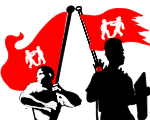|
||||||||||||||
|
||||||||||||||
There was to the struggle again between the Edionwere in Igodomigodo. But the king makers averted this. They quickly went into action by crowning Oduwa, the senior son of Ogiso Ohuede. Oduwa refused to adopt a military approach to solving the problem of rebellion of his subjects. He did not want to plunge the kingdom into civil war which his enemies wanted. They wanted to lure him to a civil war when he was unprepared Oduwa’ feared that if civil war occurred, the wealth of the nation would be destroyed. He chose a. different approach to this problem, firstly he made friends with those who accepted him and gave them gifts and titles. In the areas adjoining the territories of the Enigie who did not accept his authority, Oduwa appointed Okaevbo (Governors) and sent them to these areas. By appointing these provincial administrators to all parts of Igodomigçdo, he gradually restored law and order in the country. More powers were given to Ekaevbo who were given large areas to rule. The powers of the opposing enigie were restricted to their village or town over which they ruled. FOREIGN RELATIONS They also purchased very many articles from Igodomigodo which were either more expensive or unavailable in their areas such as brass articles for decoration, b1acksithing or materials made from iron, some decorated pottery and ivory materials. The ivory materials were very much in vogue because they were used for bangles rings, earrings and other aesthetic materials Tobacco pipes of various types were also exchanged because both tribes grew tobacco in their areas. But.., the Yorubas treated theirs better. Since then, there had been friendly relations particularly on trade, between Igodomigodo and Yoruba land.Ogiso Oduwa also encouraged relation with the southern parts of Igodonngodo, particularly the riverine areas. Although there were scarcely towns and villages in this mangrove swamp Iands adjoining the sea, some Edo fishermen had some knowledge of the Iwere (Itsekiri) and Uzon (Ijaw) people who lived in those mangrove swamp areas This contact made it easy for the Edos to increase their trade with the Itsekiri and later the Ijaws they sold clothes, Iron implements such as cutlasses, knives.. needies (ukotin) thread, bronze tobacco pipes and pepper to the Ijaws. The Itsekiris at that time used bronze for decoration and making of religious objects, The Edos having been using bronze since about 700 A D. This was why Ogiso Uwa was able to obtain a lot of brass for decorations during his time Iron, was more easily obtainable from local sources. The Igodoniigodo also got from the riverine areas items such as fish and sea food. This encouraged some of them to settle in Igodornigodo land since then. As they grew in number especially around the Ekehuan and Ikoro areas. an Okaevbo was appointed to administer them on behalf of Ogiso from Ughoton. The Ijaws were coming from Eastern delta areas such as Brass. Towns like Burutu, Escarvos or Focados were not known nor founded at that time. THE ITSEKIRI The goals of his diplomacy were’ to promote peace or conclude his treaties, develop and protect trade, economic and financial interests. Ogiso Oduwa formulated and implemented foreign policy. Ogiso Oduwa sent his Uko as agent or ambassadors to represent him and make peace and security with neighbouring; owns or people he dealt with. These diplomats carried along with their credentials or badges of offiice. They always y has a badge of Ada and Eben scepter which is still the emblem of the Oba of Benin today. The Oba’s massangers still attach the emblem or badge of Ada and Eben to their caps or uniform up till date. Once they are seen, it clear that they are Oba’s messengers. To the south Eastern areas towards the Niger Delta the Igodomigodo peoples. Influence also spread far beyond Aboh and the present day Onitsha areas. Under - the reign of Oduwa, this was achieved contacts of trade. He established his Ekevbo (Governors) in the area. When a large number of Igodomigodo people got to the areas, they met some of the people who have migrated from Igodomigodo towns. They came with new articles of trade which they ‘obtained particularly from the Yoruba areas in the west, as well as their own products. The North eastern side was not totally neglected and there was still trade connections between Igodomigodo and Nupe,. Idah and Idoma and the far Northern Nigeria where most materials for ornaments and tools were obtained. More traders visited Igodomigodo town (Benin City) more than ever, because of his friendship and international diplomacy. Oduwa was more of a diplomat in faraway lands than as a ruler at home. But domestic problems at home in addition the used the Ekaevbo to counter the Enigie who then started paying tributes. Oduwa was a lover of peace who believed in diplomacy and negotiation rather than war. Comment Box is loading comments...
|
||||||||||||||
|
| ||||||||||||||





